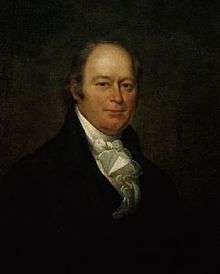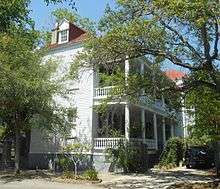William Johnson (judge)
| William Johnson | |
|---|---|
 | |
| Associate Justice of the Supreme Court of the United States | |
|
In office May 7, 1804 – August 4, 1834 | |
| Nominated by | Thomas Jefferson |
| Preceded by | Alfred Moore |
| Succeeded by | James Wayne |
| Speaker of the South Carolina House of Representatives | |
|
In office 1798–1800 | |
| Preceded by | Robert Barnwell |
| Succeeded by | Theodore Gaillard |
| Personal details | |
| Born |
December 27, 1771 Charleston, South Carolina, British America |
| Died |
August 4, 1834 (aged 62) New York City, New York, U.S. |
| Political party | Democratic-Republican |
| Spouse(s) | Sarah Bennett (1794–1834) |
| Alma mater | Princeton University |
| Religion | Episcopalianism |
William Johnson (December 27, 1771 - August 4, 1834) was a state legislator and judge in South Carolina, and an Associate Justice of the United States Supreme Court from 1804 to his death in 1834.
Early life
Johnson was born in Charleston. His father, William Johnson, was a blacksmith and supporter of the American Revolution who represented Charleston in the general assembly. During the Revolution, he was among the patriots deported to St. Augustine by British commander Sir Henry Clinton.[1] His mother, Sarah Johnson, née Nightingale, was also a revolutionary. "During the siege of Charleston, [she quilted] her petticoats with cartridges, which she thus conveyed to her husband in the trenches." [1]
The younger Johnson graduated from Princeton University in 1790, read law with Charles Cotesworth Pinckney, passed the bar in 1793, and practiced in Charleston.
In 1794, he married Sarah Bennett, the sister of Thomas Bennett, Jr., who later served as Governor of South Carolina. They had at least one child, Anna Hayes Johnson, who was the second wife of Romulus Mitchell Saunders. Anna Johnson and Romulus Saunders were the parents of Jane Claudia Saunders, the wife of Bradley Tyler Johnson, who served as a general in the Confederate States Army during the American Civil War.[2]
Start of career
Johnson was an adherent of the Democratic-Republican Party, and represented Charleston in the South Carolina House of Representatives from 1794 to 1800. From 1798 to 1800 he served as Speaker of the House.
In 1798 Johnson was appointed an associate justice of the state Court of General Sessions and Common Pleas.
U.S. Supreme Court

On March 22, 1804 President Thomas Jefferson nominated Johnson to be an Associate Justice of the United States Supreme Court, as the successor of Alfred Moore. He was confirmed by the United States Senate on May 7, 1804, and received his commission the same day. He was the first of Jefferson's three appointments to the court, and was selected for sharing Jefferson's political philosophy. Johnson was the first member of the Court who was not a Federalist.
In his years on the Court, Johnson developed a reputation as a frequent and articulate dissenter from the Federalist majority. While Chief Justice John Marshall was frequently able to steer the opinions of most of the justices, Johnson demonstrated an independent streak. In one notable instance, in 1808 he defied the orders of the federal Collector of the Port of Charleston, Attorney General Caesar A. Rodney, and President Jefferson, because he felt that the executive branch's control of maritime trade was an impermissible extension of its constitutional powers. (Johnson was nominated for Collector of the Port of Charleston on January 23, 1819, but elected to remain on the Court.)
During the Nullification Crisis in South Carolina from 1831 to 1833, Johnson again displayed his independent streak by moving away from Charleston so as not to be swayed by the intensity of local public opinion.
Career as author
In 1822 Johnson authored the two-volume Sketches of the Life and Correspondence of Nathanael Greene, a comprehensive work about the major general in the Continental Army who played a vital role in the defeat of the British during the American Revolution.[3]
Death and burial
Johnson died in New York City August 4, 1834 following surgery on his jaw. He was buried at St. Philip's Episcopal Church Cemetery in Charleston.[4]
See also
- List of Justices of the Supreme Court of the United States
- List of U.S. Supreme Court Justices by time in office
- United States Supreme Court cases during the Marshall Court
References
- 1 2 Johnson, Bradley T. "The Memoir of Jane Claudia Johnson." Southern Historical Society Papers, volume XXIX, 1901, pg 34.
- ↑ Hanson, George Adolphus. Old Kent: the Eastern Shore of Maryland , Notes Illustrative of the Most Ancient Records of Kent County, 1876, pg 57
- ↑ Johnson, William (1822). Sketches of the Life and Correspondence of Nathanael Greene. I. Charleston, SC: A. E. Miller. p. title.
- ↑ William Johnson at Find a Grave
Further reading
- William Johnson at the Biographical Directory of Federal Judges, a public domain publication of the Federal Judicial Center.
- Morgan, Donald G. (1954). Justice William Johnson, the First Dissenter: The Career and Constitutional Philosophy of a Jeffersonian Judge. Columbia, South Carolina: University of South Carolina Press. pp. 3–54 &168–189. ISBN 0872490602.
- Morgan, Donald G. Justice William Johnson, the First Dissenter: The Career and Constitutional Philosophy of a Jeffersonian Judge. Columbia, South Carolina: University of South Carolina Press, 1954.
- The Editors of Encyclopædia Britannica (2015). "William Johnson". Encyclopædia Britannica Online. Britannica. Retrieved November 22, 2015.
- Vanburkleo, Sandra F. (2007). "In Defense of "Public Reason":Supreme Court Justice William Johnson."". America: History & Life.
- Abraham, H. J. (2002). "John Marshall's Associate Justices". Journal of Supreme Court History.
- Abraham, Henry J. (1992). Justices and Presidents: A Political History of Appointments to the Supreme Court (3rd ed.). New York: Oxford University Press. ISBN 0-19-506557-3.
- Cushman, Clare (2001). The Supreme Court Justices: Illustrated Biographies, 1789–1995 (2nd ed.). Supreme Court Historical Society, Congressional Quarterly Books. ISBN 1-56802-126-7.
- The Lives and Times of the Chief Justices of the United States Supreme Court]. Philadelphia: J. B. Lippincott & Co., 1874 at Google Books.
- Frank, John P. (1995). Friedman, Leon; Israel, Fred L., eds. The Justices of the United States Supreme Court: Their Lives and Major Opinions. Chelsea House Publishers. ISBN 0-7910-1377-4.
- Hall, Kermit L., ed. (1992). The Oxford Companion to the Supreme Court of the United States. New York: Oxford University Press. ISBN 0-19-505835-6.
- Martin, Fenton S.; Goehlert, Robert U. (1990). The U.S. Supreme Court: A Bibliography. Washington, D.C.: Congressional Quarterly Books. ISBN 0-87187-554-3.
- Urofsky, Melvin I. (1994). The Supreme Court Justices: A Biographical Dictionary. New York: Garland Publishing. p. 590. ISBN 0-8153-1176-1.
- White, G. Edward. The Marshall Court & Cultural Change, 1815-35. Published in an abridged edition, 1991.
External links
| Wikisource has original works written by or about: William Johnson |
- Brief online biography of William Johnson
- Sketches of the Life and Correspondence of Nathanael Greene
| Political offices | ||
|---|---|---|
| Preceded by Robert Barnwell |
Speaker of the South Carolina House of Representatives 1798–1800 |
Succeeded by Theodore Gaillard |
| Legal offices | ||
| Preceded by Alfred Moore |
Associate Justice of the Supreme Court of the United States 1804–1834 |
Succeeded by James Wayne |
| | |||||||||||||||||||||||
|---|---|---|---|---|---|---|---|---|---|---|---|---|---|---|---|---|---|---|---|---|---|---|---|
|
 | ||||||||||||||||||||||
